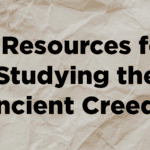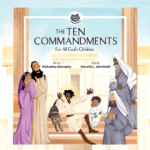
We know there are Ten Words. Yahweh wrote them with his finger on two tablets of stone (Exod 31:18; 34:1). But the church has never agreed on how to count to ten.
The Bible doesn’t give a decisive answer. There are twelve negative imperatives in Exodus 20:1–17, and one of the ten (“Honor thy father and mother”) doesn’t include any negatives. To make ten, Augustine combined the prohibition of images with the prohibition of idolatry and argued there were two commandments against coveting. Origen separated the prohibition of false gods from the command against images and counted only one command against coveting. Roman Catholics and Lutherans follow Augustine; Reformed churches follow Origen. I follow the Reformed numbering, with an Orthodox modification: Yahweh’s declaration “I am Yahweh your God” is part of the First Word, not a “preface” (as in Westminster Larger Catechism, q. 101).

To make matters more confusing, we’re never told what was on each of the two stone tablets. Following Augustine, Caesarius of Arles said the first tablet contained three commandments; the second, seven. Origen and others divided the commandments into four and six. Perhaps all Ten Words were on both tablets, a double witness to Yahweh’s covenant with Israel. We can sort through some of these debates by paying close attention to the text of Exodus 20. Whatever the two tablets contained, literarily the Ten Words aren’t divided as 3 + 7 or 4 + 6, but in half, 5 + 5.
Two tables
The Bible is also full of pairs, like the twin tablets of stone. There were two cherubim in the temple (1 Kgs 6:23–28), two pillars at the temple door (1 Kgs 7:15–22), two witnesses in various narratives. One relevant pair is priest and king. The first five words are priestly, focusing on the sanctuary—worship, images, Yahweh’s Name, the Sabbath, and honor of parents. The second five commandments are royal, having to do with political life in the land.
Jesus sums up the entire law in a pair of commandments: Love God with all your heart, soul, strength, and mind, and your neighbor as yourself (Luke 10:27; see also Gal 5:14). As Justin Martyr, Irenaeus, Augustine, and many others have said, Jesus’ two commandments summarize the two tables of the Decalogue. In the outline I’m using, the first five teach love for God, and the second fill out how we love our neighbor.
Each of the Ten Words addresses an arena of human life: worship, time-keeping, family, violence, sex, property, speech, desire. Yet they overlap and interpenetrate. Each word implies all the others. To obey the First Word, you must also refuse images; bear God’s Name; keep Sabbath; honor parents; and refrain from murder, theft, adultery, slander, greed, and lust. We keep Sabbath to honor the one God, to glorify his Name, to give life and protect property, to cultivate contentment and thankfulness. Idolatry is a kind of theft, a form of marital infidelity to the divine Husband, false witness about the living God. Every commandment is a window through which we view the whole Decalogue.
Once again, we see how the Decalogue reveals Jesus, who alone lives as Yahweh’s Son, keeping the whole law. He is the Word, Light, and Bread of the Father, whose Spirit flows from the temple of his body to bring life to the world.
This post is adapted from The Ten Commandments: A Guide to the Perfect Law of Liberty by Peter J. Leithart (Lexham Press, 2020).






